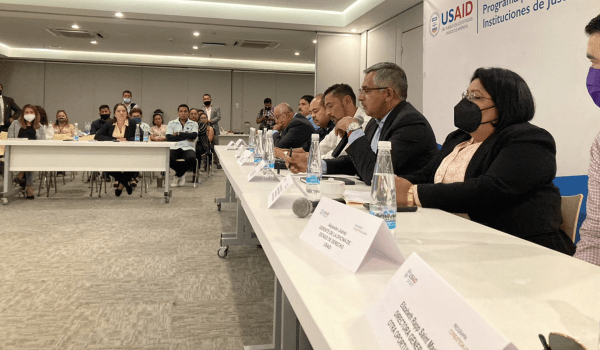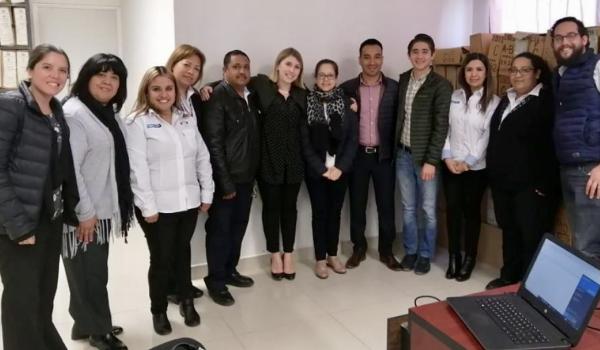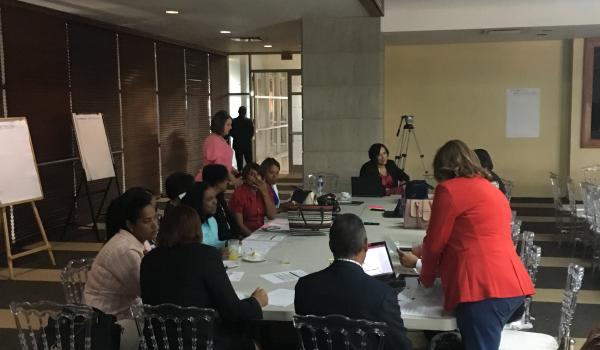Justice
Catalyzing change within local criminal justice systems with the ultimate goal of working towards fairer, more effective and accessible justice.
Our strategy in justice
Through our 100-Day Challenge methodology, we have supported frontline teams across Mexico, the Dominican Republic, and South Africa to develop innovative solutions to deep-seated problems and have witnessed never-before-seen results made possible through the adoption of a change in mindsets, cross-sector collaboration and radically new ways of working.
100-Day Challenge Participant Hidalgo
Featured justice projects

- Justice
Project, Mexico

- Gender
- Justice
Project, Mexico

- Justice
- Training
Project, Dominican Republic
Focus areas in justice
Mexico
Since 2017, we have worked extensively in Mexico to catalyze systems change in the justice sector with four different projects funded by the United States Agency for International Development (USAID): Promoting Justice Project (Projust) 2017-2020, Justice Access for Victims and the Accused (JAVA) 2019-to date, Transparency Rapid Response Project (TRRP - anti-corruption) 2018-2021, and the Program for the Strengthening of State Criminal Justice Institutions (ConJusticia) 2021-to date. In 2021, we also partnered directly with the state government of Quintana Roo in Mexico to bring the 100-Day Challenge methodology to the local justice system to combat gender-based violence.
The work has been complex and varied: beginning with 100-Day Challenges to address a single crime, accelerate results and jumpstart effective collaboration in the local system, leading to specialized task forces to dismantle entire criminal structures and 100-Day Challenges that focus on improving services for victims and defendants.
Case resolution highlights from Mexico:
- Tijuana, Baja California, saw a 2,155% increase in the number of vehicle robbery cases solved during 100 days.
- Chihuahua City, Chihuahua had an increase of 967% in business robbery cases solved during 100 days.
- Mexicali, Baja California, had a 922% resolution increase in domestic violence cases during 100 days.
- Saltillo, Coahuila had an 896% resolution increase in robbery cases during 100 days.
- Zacatecas City, Zacatecas had a 756% resolution increase in domestic violence cases during 100 days.
Dominican Republic
RE!NSTITUTE’s work in the Dominican Republic also began in 2017, in collaboration with the World Bank and the Instituto Técnologico de Santo Domingo (INTEC) to implement one 100-Day Challenge in the justice sector and to train local coaches to carry out their own 100-Day Challenges. The second phase of this project is currently underway and consists of training additional local coaches and a 100-Day Challenge due to launch in mid-2022.
South Africa
Our work in South Africa — implemented by iResults, our partner organization in the region — has centered on the justice system's response to cases of gender-based violence. This is particularly the case for the rollout of the National Strategic Plan (NSP) on gender-based violence and femicide (GBVF), as well as local capacity building and the formation of multi-sectoral coalitions. The initial pilot program launched during the COVID-19 pandemic and involved eleven courts across six South African provinces. System leaders tasked frontline teams to reduce the backlog of domestic violence and sexual assault cases and protection orders for victims. See our Gender page for detailed information on this project.
Impact from our 100-Day Challenges in Criminal Justice
Milestone for the State of Tabasco, Mexico
During their first 100 Day-Challenge, Villahermosa’s business robbery team reached a milestone for the entire state of Tabasco: the resolution of the first-ever case in the state that began with unidentified suspects, following a joint effort by the Prosecutor’s Office’s Unit for Cases with Unknown Suspects (UAID, Spanish acronym), the Specialized Prosecutor's Office for Business Robbery and the support of the Oxxo and Farmacias Similares commercial chains. The UAID analyzed 3,364 shelved (archivo temporal) business robbery case files that had no investigation leads and no suspects. They then established 30 crime patterns, involving 51 perpetrators - the vast majority of whom were re-offenders. Consequently, the team identified and arrested seven suspects linked to 93 open robbery case files. The perpetrators were convicted and sentenced.
Dismantling a local criminal organization
In Chihuahua City, the team tackling vehicle theft shared and cross-referenced information regarding this crime which led to the discovery that the same local gang was committing both vehicle theft and stealing car parts - two crimes previously addressed separately. Crime pattern analysis resulted in the arrest and dismantlement of this local criminal gang, a significant achievement stemming directly from the 100-Day Challenge.
Private sector collaboration, Chihuahua, Mexico
In Chihuahua City and Ciudad Juarez, the participation and contributions of the state’s civil society and private sector organizations were key in the attainment of impressive results. For instance, in Chihuahua City a Mexican security and technology company funded a pilot initiative involving the use of electronic tablets for police officers to more effectively log crime reports in the city.
Interagency coordination in Saltillo, Mexico
During the 100-Day Challenge, Saltillo’s robbery team established a cross-institutional working group to connect valuable information from the local police (Secretaría de Seguridad Pública Municipal) with the Prosecution’s Unit for Cases with Unknown Suspects (Unidad de Imputado Desconocido) pertaining to priority targets, responsible for multiple burglaries and robberies. Together, agents from both institutions cross-referenced data and conducted crime pattern analysis, making it possible to identify defendants with more than one open case file, as well as to request and execute arrest warrants effectively, since they had already been traced by the municipal police.
The 100-Day Challenge Sparks Legislative Reform in Zacatecas, Mexico
In Zacatecas, the 100-Day Challenge prompted an important legislative reform to change the way domestic violence cases are processed: from querella (a criminal complaint filed by the victim, where in order for the case to proceed, the victim must consent to the criminal process) to oficio (the prosecution is obliged to act without the victim’s involvement in the criminal process).
Successful crime prevention in Fresnillo, Mexico
In Fresnillo, Zacatecas, the frontline team implemented crime prevention strategies with the help of the municipal police to identify high-incidence areas or “hot spots” for domestic violence. This information was then strategically used to boost police patrols in identified target areas at specific times for a more efficient and timely response to reports of domestic violence.
Technological Innovation in Hermosillo, Mexico
In Hermosillo, Sonora, the team addressing domestic violence came up with an innovative technological tool to ensure that protection measures for victims of domestic violence, such as restraining orders, are monitored constantly with real-time status updates issued by the Prosecutor's Office. The “Visor de Órdenes de Protección” is an online platform that improves communication between the Prosecutor's Office and the police’s emergency and intelligence center (C5i) with the sole purpose of effectively protecting victims of domestic violence. It also improves the internal management of protection orders. The joint use of this platform led to better-informed police actions on behalf of the victims.
Learning
We conducted a sustainability study in 2021, covering 100-Day Challenges implemented in the Mexico justice sector from 2017-2020. We interviewed 32 frontline team members to find out what happened to the innovations and system shifts that occurred during the 100DC. Here are some of the highlights of what we learned:
- Out of 80 innovations reported, 78% of innovations were sustained.
- 100% of the people interviewed during 2021 stated that they would participate in another 100-Day Challenge.
What happened after the 100DC?
- 55% of participants stated that they perfected existing innovation after the end of the 100DC.
- 13% stated that they had continued to innovate after the 100DC, thanks to new ways of working.
Teams
110
Frontline teams Communities
44
44 communities around the world Cases in Mexico
19,118
Criminal cases solved - in a country where over 90% of crimes go unpunished, this is an important achievement! Cases in South Africa
98 %
Backlogged criminal cases solved (>90days) Cases in Dominican Republic
1,712
Criminal cases solved Sustainability
78 %
78% of innovations were sustained POSTS UPDATES
- Gender
- Justice
- Gender
- Justice
Learning
Case Study 10 January 2020
Evaluation report 1 April 2006
Evaluation report 1 January 2007
Case Study 10 October 2021
WORKING TOGETHER TO CHANGE SYSTEMS SERVING THE MOST VULNERABLE PEOPLE
Would you benefit from a dynamic partner to support you in delivering transformative change?
